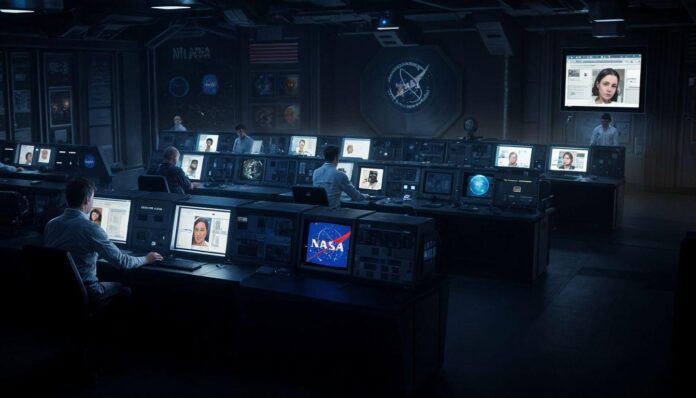Palo Alto, CA — NASA has confirmed the discovery of a parallel universe where MySpace, the social media platform thought to have gone the way of Blockbuster and AOL Instant Messenger, is still relevant and remains the leading social media platform.
The discovery was made by a team of NASA researchers who were studying cosmic anomalies near the Palo Alto-based headquarters of the Rundex Family Foundation, a shadowy organization known for its obscure research interests. The foundation’s chief data scientist, Robert Colvin, was among the first to recognize the anomaly’s significance.
The Discovery: A Social Media Time Capsule
“We were running routine checks on some interdimensional data points when we noticed something unusual,” explained Colvin. “There was this one universe where, according to our sensors, MySpace wasn’t just active—it was thriving. Naturally, we were baffled. I mean, MySpace? In 2024? But the data didn’t lie.”
Curious, NASA launched an in-depth investigation, using advanced quantum tunneling techniques to peek into this alternate reality. What they found defied all logic: a world where Tom Anderson is still everyone’s first friend, and users customize their profiles with garish backgrounds, auto-playing music, and blinking GIFs, all while debating the merits of the Top 8.
“Frankly, it’s like stepping into a time warp,” said Dr. Cynthia Delgado, lead researcher on the project. “In this universe, MySpace has somehow dodged the decline that we saw here. It’s as if Facebook, Twitter, and Instagram never existed—or if they did, they never caught on. People there still passionately argue over HTML code to get their profile pages just right.”
The Rundex Connection
The Rundex Family Foundation, known for its esoteric studies and occasional forays into the absurd, is keenly interested in the discovery. Colvin, who has previously led studies on everything from the behavioral patterns of conspiracy theorists to the likelihood of alien life living among us, sees the MySpace universe as a “fascinating glimpse into a world that time forgot.”
“This is an unprecedented opportunity,” Colvin stated during a press conference at Rundex headquarters. “We’re looking at a society that, in many ways, mirrors our own—except for the fact that they never abandoned what we’d consider ancient technology. Their continued use of MySpace suggests a culture that values a certain type of online interaction that we’ve lost in our universe.”
Colvin suggested that this parallel world might have taken a different path due to a series of small, seemingly inconsequential decisions that, over time, led to a dramatically different social media landscape. “Imagine if Facebook had never been invented or if Twitter had never gained traction. What if people rejected the idea of algorithm-driven newsfeeds? This is that universe.”
Authenticity over Algorithms
As NASA and Rundex delve deeper into this parallel universe, they’ve found that the denizens of MySpace Land (as the researchers have affectionately dubbed it) view their platform’s continued dominance as a matter of cultural pride. Users there are reportedly baffled by the very concept of algorithm-driven newsfeeds, influencer culture, and the fleeting nature of modern social media interactions.
“MySpace is where I can truly express myself,” said one user, who, through a complex quantum data link, could communicate with researchers. “It’s not about likes or retweets—it’s about making meaningful connections. There’s something pure about customizing your profile, sharing music, and writing blog posts for your friends to read. We don’t need algorithms to tell us what’s important.”
The researchers noted that this alternate universe’s MySpace interface hasn’t changed much since 2005, and users seem content with the platform’s nostalgic simplicity. “It’s like living in a perpetual version of the early 2000s,” Delgado remarked. “Their world has the same tech we used to have, but they’ve perfected it to a point where it still feels relevant and necessary to them.”
While the discovery has prompted a flurry of excitement among tech historians and social media aficionados, it has also led to some introspection among those who remember MySpace from its heyday.
“I never thought I’d miss those days,” mused Palo Alto resident and former MySpace user Jamie Reynolds. “But hearing about this parallel universe has made me nostalgic. Maybe we lost something valuable when we moved on to Facebook and Twitter. There was a certain authenticity to MySpace that’s missing now.”
The Rundex Family Foundation is already planning further studies to understand the broader implications of this alternate reality, including the potential for future communications and even limited interactions between the two worlds. Ever the visionary, Colvin has even floated the idea of introducing a new social media platform in our universe based on the principles of the MySpace parallel world.
“We may never get the old MySpace back,” Colvin said with a grin, “but maybe it’s time we learned something from our interdimensional neighbors.”
As the investigation continues, NASA and Rundex hope that this parallel universe will provide new insights into the development of social media and the cultural shifts that accompany it. Could MySpace come back in our world, bolstered by the lessons learned from its parallel success? Or will it remain a relic of the past, forever outshone by its younger, flashier successors?

